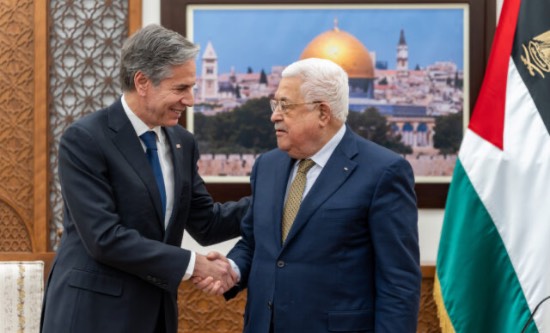Thirty years after the signing of the Oslo Accords on 13 September 1993, the false promise of negotiations is rearing its head again in talks between Saudi Arabia, Israel and the Palestinian Authority (PA). Much like during the Oslo process, the PA’s role in these negotiations threatens to throw Palestinian rights under the bus. However, a new wave of Palestinian resistance is making the maintenance of the status quo impossible.
Saudi Arabia is currently engaging with Israel and the United States about a possible normalisation deal that would end in Saudi recognition of the Israeli state. Israel has long sought such recognition from the kingdom as a means of securing its existence and isolating the Palestinian liberation struggle. If the normalisation deal goes through it is expected that other Muslim nations will follow suit. For its part, Saudi Arabia is seeking concessions from the United States, including the forming of a defensive alliance with the US and permission to build a nuclear power plant in the kingdom, in return for normalisation with Israel.
The major obstacle to normalisation, however, is the Palestinian resistance. The Saudi monarchy is aware that Israel’s brutal treatment of the Palestinians means it is likely to face staunch opposition to normalisation, both from its own people and the Arab masses as a whole. Opinion polling in the region reveals that an overwhelming majority of people continue to support the Palestinian struggle, with only 12% of Saudi respondents saying they disagreed with the sentiment that ‘the Palestinian cause is a cause for all Arabs’. When asked whether they supported their government officially recognising Israel, only 5% of Saudis agreed.
PA leader Mahmoud Abbas has been in talks with Saudi Arabia about the terms under which he would agree not to condemn Saudi normalisation with Israel. The demands Abbas has put forward include the transfer of the whole of the West Bank to PA civilian control, a freeze to Israeli settlement building in the territory, and the resumption of a peace process that will lead to Palestinian statehood. Saudi Arabia has also agreed to increase funding to the PA to the tune of several hundred million dollars.
Israel will never agree to these demands. This year has seen a record expansion of illegal settlements in the West Bank; including East Jerusalem, there are over 700,000 Israeli settlers living in the post-1967 occupied territory. The idea that Israel would agree to transfer this land to PA control is a fantasy. On the contrary, what is really being put on the table by Abbas and Riyadh is a rehashing of the Oslo process, where false promises of statehood and sovereignty were exchanged for an entrenching of the Israeli occupation over the very land that was supposed to become a Palestinian state. Oslo’s main purpose was to ensure Israeli ‘security’ (ie Israel’s ability to continue its occupation without facing Palestinian retaliation); this was achieved through the establishment of the PA, whose main role is to suppress the Palestinian resistance.
This fact is illustrated by Saudi Arabia’s own demand on the PA in return: the kingdom wants Abbas to use the new funding to get the resistance of the Palestinian people under control. A wave of armed resistance has been rapidly growing across the Palestinian territories, the strength of which was demonstrated in Jenin in June when Israeli soldiers were forced to make a humiliating withdrawal in the face of Palestinian fighters. Saudi Arabia understands that such resistance is a threat to its normalisation attempts, threatening to further stoke Arab hostility to Israel in support of a renewed Palestinian uprising.
Abbas’s backers in Riyadh, as well as those in Tel Aviv and Washington, see the spread of this resistance as his and the PA’s failure. That is why, since the incident in Jenin, the PA has accelerated its attempts to crush this resistance: Abbas is reported to have told his security chiefs to strike these groups with ‘an iron fist’, and recent months have seen the PA jail dozens of Palestinian fighters, political dissidents, activists, journalists, and students.
These efforts, however, are failing. The armed resistance in cities like Jenin has maintained its strength and is continuing to grow. The widespread understanding among Palestinians that the PA and its security forces does not exist to protect them, but rather protects the Israeli occupation from them, is fuelling a growing armed resistance movement distinct from and in opposition to the PA. Public opinion polls this year showed that 68% of Palestinians support armed resistance groups, and nearly 90% believe the PA has no right to arrest them. 80% of Palestinians want Abbas to resign.
The PA’s negotiations with Saudi Arabia and Israel must be understood in this context. All these parties would be more than happy to continue the Oslo status quo: perpetual Israeli occupation supported by a corrupt PA suppressing all Palestinian resistance. The refusal of the resistance groups to be suppressed is making this status quo untenable. Should Abbas fail to come out strongly against it, a Saudi deal with Israel could be the spark that ignites a full-on rebellion against the PA. Abbas is signalling to Saudi Arabia that he cannot be seen to consent to a deal with Israel – for doing so could spell not only the end of his own political career, but indeed could trigger an armed uprising against the Israeli occupation as a whole. Abbas’s demands are therefore more about preserving the stability of the PA than anything to do with upholding Palestinian rights. What really matters is the increased Saudi funding to the PA, which will be used to step up attempts to stifle the growing Palestinian resistance. Saudi Arabia appears likely to proceed with the deal with or without the PA’s open support, but the continuing growth of the Palestinian resistance is a spanner in their plans to which neither Saudi Arabia, Israel, nor the PA have an answer.
Wesam Khaled




